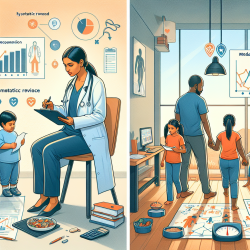Introduction
In the realm of rare disease diagnostics, practitioners often face the daunting task of identifying causative genetic variants among millions of possibilities. The research article titled "Phenotype-driven approaches to enhance variant prioritization and diagnosis of rare disease" by Jacobsen et al. (2022) provides a comprehensive review of how phenotype-driven methods can significantly improve diagnostic yields. This blog aims to translate these findings into actionable insights for practitioners, particularly those in the field of speech-language pathology, to enhance their diagnostic acumen and ultimately improve outcomes for children with rare diseases.
The Power of Phenotype-Driven Approaches
The study highlights the transformative potential of deep phenotyping combined with variant data, such as allele frequency and predicted pathogenicity, in diagnosing rare diseases. By leveraging tools that automate phenotype-driven approaches, practitioners can streamline the diagnostic process, making it more efficient and accurate. This is particularly crucial in speech-language pathology, where early and accurate diagnosis can significantly impact intervention strategies and outcomes for children.
Implementing Research Outcomes
For practitioners looking to integrate these insights into their practice, the following steps are recommended:
- Embrace Deep Phenotyping: Collect comprehensive clinical phenotype data for each patient. Utilize standardized ontologies like the Human Phenotype Ontology (HPO) to ensure consistency and accuracy.
- Leverage Automated Tools: Utilize phenotype-driven variant prioritization software, such as Exomiser or LIRICAL, which have demonstrated high efficacy in identifying diagnostic variants.
- Stay Informed: Keep abreast of the latest advancements in genomic tools and methodologies to continuously enhance diagnostic capabilities.
Encouraging Further Research
While the current tools and methods show promise, there remain challenges that necessitate further research. Practitioners are encouraged to engage in or support research efforts aimed at:
- Improving the detection and prioritization of noncoding and structural variants.
- Identifying causative variants in genes not previously associated with human disease.
- Developing better methods for dealing with complex genetic scenarios, such as incomplete penetrance.
Conclusion
Phenotype-driven approaches represent a significant advancement in the diagnosis of rare diseases, offering a pathway to more precise and effective treatments. By integrating these methods into practice, speech-language pathologists and other healthcare professionals can enhance their diagnostic accuracy, ultimately leading to better outcomes for children with rare diseases.
To read the original research paper, please follow this link: Phenotype-driven approaches to enhance variant prioritization and diagnosis of rare disease.










